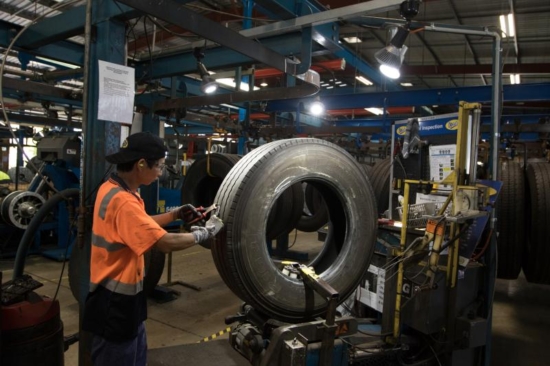Bandag celebrates 60 years in Australia
 Bandag’s plant in Wacol, Queensland (Photo: Bridgestone)
Bandag’s plant in Wacol, Queensland (Photo: Bridgestone)
Bridgestone has celebrated the diamond anniversary of the very first Bandag operation to join the group. Today Australia’s sole producer of pre-cured retread materials, Bandag, has marked 60 years of local manufacturing, a milestone that Heath Barclay, managing director of Bridgestone Australia & New Zealand, says is “significant for any business, let alone a manufacturing business.” Barclay is adamant that “the future is bright for Bandag.”
No new tyres have been manufactured in Australia since 2009, and the Bandag plant in Wacol, Queensland is thus the last facility in the country making rubber compound for use in tyres. It is responsible for producing pre-cured tread for the eight company-run Bandag retread factories and 30 licensed dealers throughout Australia and New Zealand, as well as being the primary producer for the Asia Pacific region, exporting to Thailand, Fiji, China, Korea and Indonesia. Wacol also counts as a key part of the global supply chain for other Bridgestone regions, including America and Europe.
“Six decades of manufacturing is a huge achievement. This milestone celebrates the history of Bandag in Australia, but also points to the continued relevance retreads play in our market, and the role they play in Bridgestone’s vision towards being a sustainable solutions provider,” says Barclay. “We’re proud to mark this occasion and look forward to celebrating many more milestones for Bandag and the role locally made retreads will play in our future.”
History of Bandag in Australia
For those playing along at home, the name Bandag is taken from the initials of the man who invented the pre-cure retreading process, his hometown in Germany, and from a corporate abbreviation. It so happens that Bernhard Anton Nowack of Darmstadt established his business as a plc, or AG company.
Bandag’s formation in Australia was driven by Bill McNichol, the founder of Queensland Tyre Retreading Pty Ltd. Having read about the Bandag process pioneered by Nowak in a trade magazine, he sent his eldest son Gordon to Germany to secure information on the process.
By 1961 global rights to the Bandag process belonged to American Roy J. Carver, who learned about the process by chance when visiting Darmstadt in 1957. McNichol flew to Muscatine, Iowa, to secure the Australian rights to the process. A draft agreement was formed giving McNichol the rights to use Bandag equipment and supplies, and following a revision to the agreement, the right to manufacture in Australia. McNichol imported a complete retreading plant and installed it at his former hot-cap retreading shop in Brisbane. Demand saw Bandag expand rapidly with a second plant in Sydney, and then Melbourne and Cairns soon after.
In 1970, the decision was made to relocate and consolidate Bandag’s production efforts into one site, and 20 acres of land was purchased in the Wacol Industrial Estate – where Bandag remains to this day.
Following McNichol’s death in 1970 the company changed hands several times. Blue Metal Industries took over the Australian operation in 1976, and Boral acquired the business in 1982. Bridgestone’s association with Bandag commenced in 2000 when Bridgestone Australia purchased the Australian and New Zealand operations from Boral, with Bridgestone Corporation then acquiring Bandag Inc on a global level in 2007.




Comments